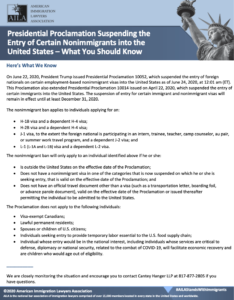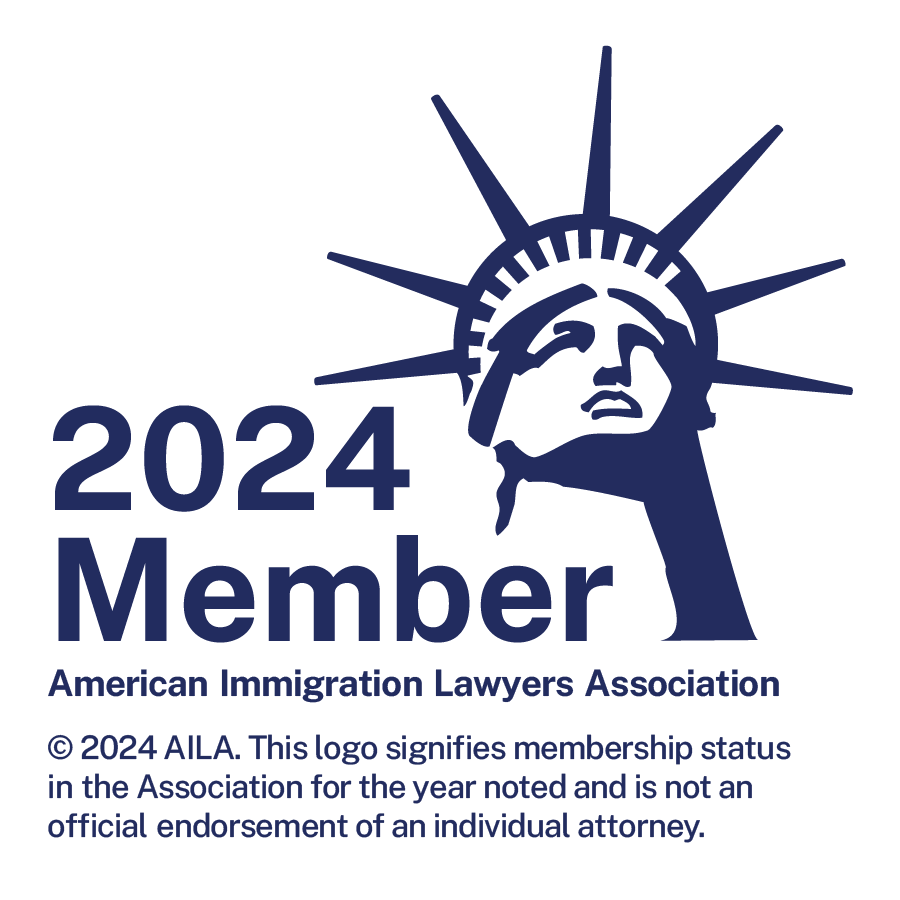USCIS is postponing until August 30, 2020 its plans to furlough more than 13,000 employees, hoping that the additional time will result in Congress approving its emergency funding request.
Check-in with Department of State’s Charlie Oppenheim regarding the August Visa Bulletin
In the August “check-in,” Charlie describes the movement in each category which is readily apparent from looking at the Visa Bulletin. Charlie’s predictions on future movement of the visa categories are few:
· F2A is expected to remain current in September and October.
· EB-1 Worldwide (including El Salvador, Guatemala and Honduras, Mexico Philippines and Vietnam) will continue to remain current through the end of this fiscal year.
· While there is still potential for forward movement in EB-1 China and EB-1 India in September, any advance movements are unlikely to be as dramatic as in August.
· EB-2 Worldwide (including El Salvador, Guatemala and Honduras, Mexico Philippines and Vietnam) will remain current through this fiscal year. EB-2 China advances approximately nine weeks from November 8, 2015 to January 15, 2016. In contrast, EB-2 India holds at July 8, 2009 in August. It is currently estimated that there is a sufficient amount of worldwide demand to reach or approximate the EB-2 annual limit for FY2020.
Hong Kong Executive Order
Because of this July 14, 2020 Executive Order, there is great concern whether persons born in Hong Kong will be chargeable to the China visa category. The Visa Office continues to review this issue but there is legal authority that the Order cannot alter the separate chargeability of Hong Kong. Section 103 of the Immigration Act of 1990 granted the separate chargeability treatment to persons born in Hong Kong. Section 103 states that Hong Kong will be treated as a separate foreign state, “and not as a colony or other component or dependent area of another foreign state.” Stay tuned for updates on this important issue.
Presidential Proclamation Update
The US Department of State confirmed, “If you were in the US on June 24th but left and your visa expired, you are not subject to the Proclamation [and] may renew your visa before December 31, 2020.”
In a reversal of prior guidance, the US Department of State announced via Twitter that Presidential Proclamation 10052 of June 22, 2020, amending Presidential Proclamation 10014 of April 22, 2020, does not apply to H-1B, H-2B, J-1, and L nonimmigrants who were physically present in the United States on June 24, 2020, and whose visas in one of the affected categories subsequently expired. Thus, should an individual who was in the United States on June 24, 2020, leave the United States and require renewal of a visa to return, the individual is eligible to apply for a new visa at a US consulate/embassy abroad once routine visa services become available.
As always, please contact Cantey Hanger before you finalize any international travel plans and the situation is subject to change.
Presidential Proclamation Suspending the Entry of Certain Nonimmigrants into the United States – What You Should Know
PRESIDENT TRUMP’S JUNE 22, 2020 PROCLAMATION
We are all aware that this proclamation suspends the entry into the U.S. of certain H-1B, H-2B, J and L nonimmigrants and their spouses and children.
There are few exceptions and they primarily focus on the national interest of the U.S. including providing medical care or medical research for COVID-19, providing services critical to defense or law enforcement, and providing services that facilitate the economic recovery of the U.S.
Be aware that this proclamation also instructs other actions to be taken to ensure that the presence in the U.S. of H-1B nonimmigrants and those seeking EB-2 or EB-3 benefits do not disadvantage U.S. workers. There are no details provided at this time as to what these actions may be, but speculation abounds that they could include an increase in Department of Labor audits of labor certifications and possibly re-testing of the market for labor certifications.
HIGHLIGHTS FROM CHECK-IN WITH CHARLIE REGARDING JULY VISA BULLETIN
EB-1 Worldwide remains current in July and should remain so through the end of this fiscal year.
EB-1 India advances significantly, moving forward eleven months from June 8, 2016, to May 8, 2017.
EB-2 Worldwide (including El Salvador, Guatemala and Honduras, Mexico, Philippines, and Vietnam) remains current in July and should do so through FY2020.
EB-2 China and EB-2 India will certainly exceed their per country limits this year. The open question is how close the EB-2 category will be to reaching its worldwide limits.
EB-3 Worldwide (including El Salvador, Guatemala and Honduras, Mexico, Philippines, and Vietnam) and EB-3 Worldwide Other Workers (including El Salvador, Guatemala and Honduras, Mexico, Philippines, and Vietnam) which advanced more than ten months in June, advances at a significant yet slower five month pace in July 2020 from November 8, 2017, to April 15, 2018.
ATTENTION F-1 STUDENTS ATTENDING COLLEGE FALL 2020
Temporary exemptions for Spring and Summer 2020 provided for online course instruction while maintaining F-1 status. That changes for the Fall semester.
Temporary exemptions for Fall 2020 provide that:
1. Students attending schools operating entirely online may not take a full online course load and remain in the U.S. Those students will be considered out of status and subject to removal proceedings. Those students must either depart the U.S., or transfer to a school with in-person instruction to remain in status.
2. Students attending schools operating under normal in-person classes are bound by existing regulations, which means they may take a maximum of one class or three credit hours online.
3. Students attending schools adopting a hybrid model, i.e., a mixture of online and in person classes, will be allowed to take more than one class or three credit hours online. Contact your school’s international office for information on how to remain in valid status in this situation.
F-1 students attending English language training programs and M-1 students are not allowed to enroll in any online courses.
President Trump’s Proclamation effective June 24, 2020
The Proclamation suspending entry of nonimmigrants to the U.S. is effective June 24, 2020 at 12:01 AM ET and extends through December 31, 2020, subject to revisions and extension.
This Proclamation extends the earlier April 22, 2020 Proclamation suspending entry of certain immigrants into the U.S. through the end of the year as well.
The Proclamation affects the following nonimmigrant categories plus spouse & children: H-1B, H-2B, J and L.
It only applies to those individuals if they are:
· Outside of the U.S. on the effective date of the Proclamation;
· Do not have a nonimmigrant visa that is valid on the effective date of the Proclamation; and
· Do not have an official travel document other than a visa such as advance parole which is valid on the effective date of the Proclamation.
It is not clear if Canadian citizens who are not required to have a visa will be exempt from this Proclamation.
There are limited exemptions such as those seeking to enter the U.S. to provide temporary labor essential to the U.S. food supply chain, or those who are need to provide services in the national interest of the U.S. such as defense, medical care to COVID-19 patients, or essential to facilitate the immediate and continued economic recovery of the U.S.
This Proclamation does not affect those nonimmigrants already in the U.S.
__________
This office advises against international travel in the event further restrictions are placed on nonimmigrants.
The Supreme Court Rules that DACA May Remain in Place.
Great news! The Supreme Court ruled today that DACA may remain in place, dealing a blow to the Trump Administration’s efforts to terminate the program.
- « Previous Page
- 1
- …
- 5
- 6
- 7
- 8
- 9
- …
- 14
- Next Page »



